A few years ago I entered in a short-lived collaboration with onetime Grand Prix Top 8 competitor Justin Polin. We did a couple of articles together for Brainburst Premium which, while well-received by certain readers, weren’t a good fit for the company. Justin’s interest in Magic and strategy writing subsequently waned and three years later, here I am at Star City.
Though working with Justin didn’t create any kind of a huge bible of Magic lore and wisdom, it did introduce to me the idea of strategy, tactics, and operations as methods of dissecting Magic actions. I like to think of strategy and tactics as big versus little, The Plan against the individual plays that we use to execute on it, but the idea of operations was at the time totally new to me. Justin, a history buff and member of the Vast Right-Wing Conspiracy, tried to explain to me that operations had only ever been really successful in German troop deployment during World War II, but I wanted to figure out how to translate that to some kind of an edge in Magic duels.
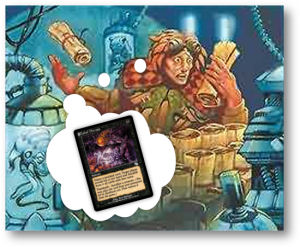
In a company, the operations department is in charge of moving all the little cogs that actually do all the work. Project managers neither produce creative nor actually write code; they liaise between marketers who need Web pages put up and the programmers who deliver the finished interfaces. The Chief Operating Officer is very rarely responsible for direct revenues, but manages all the human resources elements that ensure happy – read paid – employees, who are in turn responsible for popping out widgets or making sales. By the same token, there are all kinds of factors that affect especially constructed tournament performances that we never talk about in strategy sites… A really common one is card availability.
The major reason Star City Games dot Com exists is to serve the need of card availability. I couldn’t play in Champs last year – despite creating a powerful and influential new archetype – because I didn’t have the cards! The Pro Tour is littered with finishes dictated by whether or not someone’s friend or barn had the fourth Cabal Therapy or not. At PT: Rome, where Erik Lauer made Top 8 with the best version of the best deck and Randy Buehler was frozen into Top 16 only due to abysmally bad luck, Team CMU actually sent a couple of Rec-Sur decks because they didn’t have enough Academy sets. We can talk about card advantage all we want but when you step down from the Ivory Tower, issues like this one become pretty clear. They really do affect tournament outcomes.
We know that the availability of cards is a factor in the creation of a successful deck. Just consider Critical Mass, the deck that I used to win a PTQ two weeks ago, that Gerard Fabiano used most recently to make Top 8 of GP Mexico City.
Creatures (18)
- 4 Sakura-Tribe Elder
- 2 Isao, Enlightened Bushi
- 4 Meloku the Clouded Mirror
- 4 Kodama of the North Tree
- 4 Keiga, the Tide Star
Lands (23)
Spells (19)

The main deck alone contains 24 rares, and 4 of them are Umezawa’s Jitte. Even Gnarled Mass, the namesake of the deck, was brushed aside for the rare version: Isao, Enlightened Bushi. Going to the sideboard, Critical Mass adds 8 more rares: more than half the sideboard. When Gerard made Top 8, he removed a common Hisoka’s Defiance from the main to play another rare Legendary Creature. It should be obvious how important it is to have rare cards to play in Constructed deck. You can’t play the best decks without Jitte, Gifts Ungiven, and Kagemaro, all cards with little gold symbols. If I weren’t friends with Tony Tsai, it’s unlikely I would have an invitation to PTLA right now. Now I’m not going to talk about card availability as a social good or bad, or a haves versus have-nots basis, but rather as an element of operations. It is interesting to look at parts of the game that we take for granted and see how they can influence the result of a game.
Consider this type of mistake I see every tournament:
John plays Duress on Sol. Sol shows John this hand:

Phyrexian Plaguelord
Pernicious Deed
Birds of Paradise
Ravenous Baloth
Forest
Swamp
Swamp
John of course takes Pernicious Deed.
On his turn, Sol draws a card and plays Forest into Birds of Paradise, leaving this board:
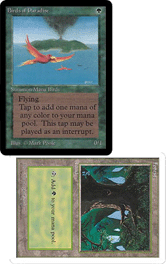
Sol made a colossal error in this sequence. He made one that could have been prevented before the tournament ever started. Do you know what it is?
Careful readers probably noticed that Sol played his Birds of Paradise using A Different Forest Than He Showed John With The Duress. Jon Finkel favorite card in a fundamental sense was Wandering Eye. Wandering Eye, besides being a busty blocker and annoying evasion creature in a format full of 2/2 Rebels, let Jon make the optimal play at all times. More than that, it showed him how often his opponents would miss the optimal play. When you make a play like Sol’s in the above hypothetical, you give your opponent free information. With free information, he can better gauge his own plays and certainly has more knowledge of when he can press versus when he has to play around the top of your deck.
A subtle corollary to this is Jon Becker general play demeanor both in tournaments and money draft. Jon was trained by Mike Long in the days of the original Tongo Nation, and though most of you probably only know him as the video coverage guy for Pro Tour broadcasts, he once ran the tables at Worlds for six or seven straight rounds and is a money drafter feared by his teammates and opponents alike for the number of Unearthly Blizzards he is willing to play. Whenever Jon wins a close one and the opponent asks if he topdecked what he needed, the answer is invariably “Yes.”
Now this isn’t because Jon is lucky and ripped. In fact, he probably didn’t just rip. In fact, he was probably sandbagging the third Unearthly Blizzard since his opening grip. Why he would keep a hand with a set of Unearthly Blizzards no one knows, but when you are on the receiving end of that third fake Falter, you probably start to go a little bit tilt. When it creeps into your mind that he ripped the third Unearthly Blizzard – probably the only card that would have saved him, did you see the crap he’s playing? – that tilt gets a little bit more tilted. Next game against Jon, or next match, when you are playing against his teammate, you might not be at your best. Things like that fall a bit under the “Magic: the Intangibles” area, but are also important parts of your overall operations for competitive play.
For example, you should know your strategy going into a tournament (this is my Plan against x), your tactics (this is how I am going to accomplish The Plan), why not your demeanor? If your answers are canned, they will come across more fluidly and be more convincing. Don’t forget: the best Magic players don’t just lie, they mix lies with truth in order to keep their opponents guessing.
The last time I won a PTQ where Mishra’s Factory was legal, I played with a full set of Antiquities art. That is wrong. I was playing with Cursed Scroll in that tournament and, just as in the Sol error from above, there is no reason to give the opponent more information than is necessary. A really good rule of thumb is to play the same art on all your cards of the same name. Little things like this will have your opponents hitting with Cabal Therapy less often and playing into your tricks and bombs when you want them to.
Quick question: What card is this?
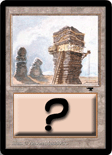
At a glance, I would say Urza’s Tower.
It’s not. It’s Urza’s Mine.
These cards are all also Urza’s Mine.
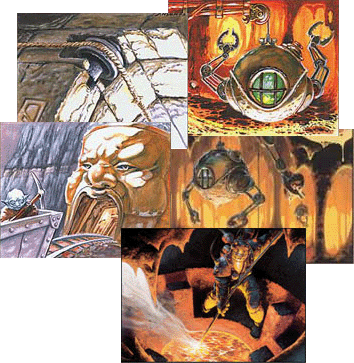
Most rules have their exceptions. I think that the Urza’s lands are a place where you might want to vary which art you play on your lands. The reason? The opponent will generally look to your Scarce Resource. If you have two Towers, two Mines, and a Power Plant, he’ll aim for the Power Plant and break up your UrzaTron. Now what happens when he doesn’t know which one is which? You can easily play different art for every piece of the ‘Tron, so this is something worth thinking about. You might even get really tricky and play two copies of some art and not of others. Seem confusing? Imagine you were the guy on the other side of the table, who wasn’t prepared for this setup coming into the tournament (now obviously you’re going to want to know which is which yourself, but that should go without saying).
Is this a mean spirited or somehow underhanded way of doing things? Not in my opinion. The careful opponent will not fall prey. But if you arrange your cards in a certain way, group certain lands with one another or flit others off to the side, it is more than possible that the wrong target will go to the graveyard at the hands of Molten Rain.
Going above and beyond anything I have ever seen or heard of before, Greg Weiss established a superb operations advantage in the last Extended PTQ season. He played a weird but effective Stax deck full of cards that no one knew. In fact, he had to get judge confirmations on things like infinite loops that took more than one turn to complete so that he could “imply” a win even when the loop was not as obvious as the usual Aluren or Life infinities.
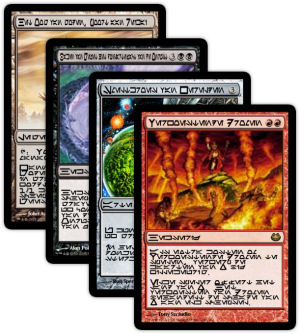
Greg’s deck was filled with cards like Gods’ Eye, Gate to the Reikai, Beacon of Unrest, Crucible of Worlds, and Devastating Dreams. None of these are cards that the typical PTQ player is familiar with… especially when they are in all different languages. Not settling for a single foreign language, Greg played Chinese, Korean, German, and Japanese non-English cards. Pushing both the “play different Urza’s Lands” operations technique and rogue deck design to their furthest extreme, Greg’s solitaire deck really and truly defied interaction, and he got a few more percentage points as his opponents were less ikely to make the right plays than they would have against a “regular” off-the-metagame deck choice.
Via the concentration on operations, you have another aspect of your game to sharpen. While superior strategy is generally the most important element of a Magic player’s suite, with tactical missteps the most frequent source of his losses, sharp operations is a place where you can pick up free wins – or at least avoid embarrassing losses – before the tournament ever starts. Make sure you have the cards for your deck. If you can, play the same art so as to mask information from the opponent. Sometimes, though, it is right to play different art – or cards in different languages – as long as you know what is going on yourself. It is not difficult to play a clean operational game, but at its heights, this aspect of Magic might be the difference in a Blue Envelope or not.
LOVE
MIKE
Bonus Section: Operations Inaction
About the time I started working with Justin on the Strategy, Tactics, and Operations series, BDM became nearly as obsessed with figuring out the operations of Magic as I was. We developed a really good deck for Rob Dougherty Boston Open and carted a sporty coupe full of Neutral Ground regulars all playing the same, effective, deck to snowy Mass.
“How’s our operations for this tournament?” Brian asked at least five or six times on the way. We were running late but called ahead to make sure Rob would keep spots open for us. They acceded even when we missed our exit and went twenty minutes in the wrong direction. When we got to the tournament, Brian handed Rob a computer printout and scribbled all our names in the corner. I had double-checked the paper in the car, confirming our lists. We skirted into the tournament right under the bell and saving a second on deck registration didn’t hurt.
“How’s our operations for this tournament?” Brian beamed as we sat down for our first rounds.
Well, operations ended up pretty bad. Brian had actually grabbed an old email and handed that to Rob… even though I okay’d what must have been some other paper in the car; it turns out he had more than one sheet in his bag. As such, we all got game losses.
Remember: You might not be very good at Magic, you might make tons of mistakes, but anyone with an ounce of discipline can win games via good operations. Don’t screw up your deck registration sheet, don’t show up for your round late, and don’t ever, ever, play the same sleeves twice. The one time in the past five years that I played the same sleeves on consecutive days of a Grand Prix I got called for marks by an opponent and had to re-sleeve anyway – if there is one idiot I will never pity, it’s the guy who complains about manascrew the round after playing while eating french fries.
